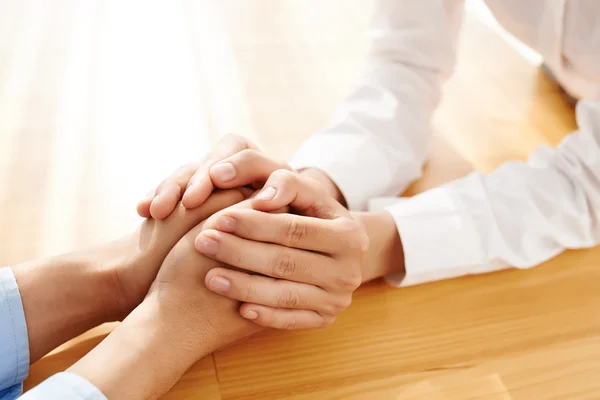They say empathy is key to building healthy relationships. But part of building relationships is to manage your emotions and the emotions of others. A true empath understands the pain and happiness of others and goes out of their way to help others.
But don’t confuse empathy with sympathy. While both people share similar qualities, the role of an empath is to sense and understand what others around them are feeling. In addition, an empath has a knack for understanding what people think.
So there’s a case to be made where empathy can help you build better relationships with the people around you. Whether you’re looking to build romantic relationships or professional relationships, here is how empathy can help you achieve your relationship goals.
Empathy Makes You A Better Listener
A true empath is a person who talks with others and tries to understand what they’re going through. But to do that, you need to listen to what people say. Being a good listener is a character trait that isn’t easy to develop.
But you can try to develop the skill by listening when others vent their emotions. For example, you must listen if a friend or coworker calls you to vent their frustration about stress or their relationship. Listening to their problems tells the other party you’re interested in their personal and professional life. More so, it tells them you want to offer a helping hand and try to find a solution to the problem together.
A good empath also looks for signs that indicate what emotions others are feeling. Unfortunately, some people do an excellent job of hiding their emotions even when venting, making your job more difficult. But being a good listener is the most important trait of an empathic person. Thus, listening helps you build better relationships with the people around you.
Empathy Makes You Understand What They’re Going Through
Essentially, empaths listen to other people and put themselves in their shoes. They understand the emotions they’re going through and adopt these emotions as their own. If a person is frustrated, the empath is also sharing these emotions.
You can use empathy to forge stronger bonds with the people around you by simply sharing the emotions they’re giving out. You fully understand what they’re going through and offer first-hand advice on how to deal with the situation. You essentially become one with the person talking and have a greater understanding of their emotions.
This makes it easier to console them and signal that you’re willing to share these painful emotions, so they don’t have to do it alone.
Empathy Makes You See A Different Side
Every person is unique with their own traits, skills, and emotions. But people rarely change or are willing to see what the other person sees. They might put up a facade for the time being to offer a helping hand, but truly seeing and understanding the opposite side is an ability only empaths have.
Fortunately, we are all empathic in one way or another. For example, we all want to help a friend going through a toxic relationship or a coworker during a stressful period. But we never truly commit to these emotions. Instead, when the conversation ends, we return to our usual selves as if nothing happened.
Only a true empath can see what the other person is going through. On that note, an empath can sympathize with another person and use these emotions to build better relationships. This signals the person of your true intentions – to help when others won’t. They will see the value in having you as a friend and thus forge a stronger bond.
Empathy Makes You Step In And Help
Listening and sharing emotions are qualities of empathic people. But a true empath will go a step further and act on these emotions. For example, if you’re listening to a coworker venting about being overworked, will you step in and offer a helping hand? If you’re not an empathic person, chances are you wont.
A study showed that people with high empathy chose to spend more time helping others than those with low empathy. While listening is a form of helping, acting on their emotions is possibly the only way to make a difference truly.
But why is that the case? Why are highly empathic people willing to step in and find a solution? Well, it’s all because of the before-mentioned factors. An empath shares the other person’s emotions and puts themselves in their shoes. They understand what they’re going through and are willing to make a difference.
You can use these qualities to build better and stronger relationships. More so, others will notice your willingness to act and help when very few people will.
How to be A Better Empath?
Not everyone is a natural empath. But that doesn’t mean we cannot do something about it. You can become a better empath by practicing the core essentials of empathy. Over time, you will notice a shift in your ability to understand and feel what others are going through.
To help out and understand how to be a better empath, here is what you need to do regularly:
- Communicate With Others
Communication is the only way for an empath to understand the issues and emotions of others. While you won’t be running into people with issues, nor will people share their problems from the get-go, try to communicate with them regularly and pay attention to their feelings.
- Watch Their Body Language
How a person conducts themselves can tell you plenty about their feelings. Even if a coworker does an excellent job of hiding their emotions, look for body and language cues to determine if they’re going through a difficult time.
- Be A Listener
Listening is essential to developing your empathy skills. If you’re not a good listener, you will fail to attract people, and they will be less willing to share their problems and emotions with you. On the other hand, being a better listener is very easy to train. All you need to do is be there and listen.
Conclusion
We can correlate empathy with being a good person. The similarity between both is that people want to be around good people. More so, people want to be around positive people and people willing to offer a helping hand. Whether the other person needs someone to hear them out or sympathize with them, empathy can help you build better relationships with the people around you.
Author’s Bio:
Erik Bergman co-founded Catena Media and helped grow it to over 300 employees and a $200 million valuation before stepping away to start Great.com, an iGaming organization that donates 100% of its profits to environmental charities. In addition to running a successful online affiliate business, Erik also hosts the Becoming Great podcast, shares entrepreneurship tips with his more than 1 million social media followers, and contributes to sites like Entrepreneuer.com, Business Insider, Foundr, and Forbes.








